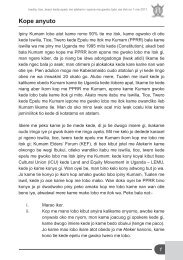Land transactions in land under customary tenure in Teso
Land transactions in land under customary tenure in Teso
Land transactions in land under customary tenure in Teso
You also want an ePaper? Increase the reach of your titles
YUMPU automatically turns print PDFs into web optimized ePapers that Google loves.
<strong>Land</strong> <strong>transactions</strong> <strong>in</strong> <strong>land</strong> <strong>under</strong> <strong>customary</strong> <strong>tenure</strong> <strong>in</strong> <strong>Teso</strong><br />
Section 1<br />
Introduction<br />
One of the central planks of the Government’s development strategy is <strong>land</strong><br />
policy – and this is true for most formerly colonised states. <strong>Land</strong> issues are<br />
often ignored by many <strong>in</strong>terested <strong>in</strong> development, either because they are<br />
believed to be too complex and specialised, or because their importance is<br />
not recognised. Nevertheless, <strong>land</strong> policy is one of the largest components of<br />
the plan for the modernisation of Agriculture (<strong>in</strong> which many more actors are<br />
<strong>in</strong>terested).<br />
Current <strong>land</strong> reform has been based around three ma<strong>in</strong> pr<strong>in</strong>ciples:<br />
a) the recognition, for the first time <strong>in</strong> Uganda’s history, of <strong>customary</strong> 1<br />
ownership of <strong>land</strong> (i.e. where <strong>land</strong> owners have never had any papers for their<br />
<strong>land</strong>, but everyone has always recognised the family as the ‘rightful’ owners of<br />
that <strong>land</strong>.<br />
b) the conversion of <strong>customary</strong> ownership to formal freehold titl<strong>in</strong>g, so that<br />
owners have greater security of <strong>tenure</strong> and can use the <strong>land</strong> as collateral for<br />
loans, and to facilitate agricultural growth and a <strong>land</strong> market.<br />
c) the development of a <strong>land</strong> market, so that <strong>in</strong>vestors can acquire <strong>land</strong><br />
and use it more productively.<br />
This strategy relies on certa<strong>in</strong> assumptions, which have been critiqued on<br />
theoretical and practical grounds 2 . It seems obvious, though; that any work to<br />
improve a <strong>land</strong> <strong>tenure</strong> system will depend largely upon what is already there.<br />
Knowledge of what is actually happen<strong>in</strong>g with<strong>in</strong> a rapidly evolv<strong>in</strong>g ‘<strong>customary</strong><br />
<strong>tenure</strong>’ is lack<strong>in</strong>g. S<strong>in</strong>ce it is <strong>in</strong>conceivable for the Government to <strong>in</strong>corporate<br />
the majority of <strong>land</strong> <strong>in</strong> Uganda with<strong>in</strong> a formal State <strong>land</strong> adm<strong>in</strong>istration <strong>in</strong> the<br />
short or medium term, <strong>customary</strong> <strong>tenure</strong> is go<strong>in</strong>g to rema<strong>in</strong> the dom<strong>in</strong>ant <strong>land</strong><br />
hold<strong>in</strong>g system for the foreseeable future. No-one believes that <strong>customary</strong><br />
<strong>tenure</strong> is operat<strong>in</strong>g without problems. Unless it is believed that noth<strong>in</strong>g can<br />
ever be done with <strong>customary</strong> <strong>tenure</strong> except to wait for it to die away, therefore,<br />
it is imperative to <strong>under</strong>stand its work<strong>in</strong>gs and its limitations very well. The<br />
alternative is to abandon the majority people to their fate, rather than support<br />
them. S<strong>in</strong>ce <strong>land</strong> is rightly seen as a pillar of development, and is one of the<br />
ma<strong>in</strong> sources of conflict nationally, this does not seem an attractive option.<br />
The <strong>Land</strong> and Equity movement <strong>in</strong> Uganda – LEMU has already conducted<br />
research <strong>in</strong> <strong>customary</strong> <strong>tenure</strong> <strong>in</strong> northern Uganda (<strong>in</strong> Lango and Acholi<strong>land</strong>).<br />
4<br />
Mak<strong>in</strong>g <strong>land</strong> work for us all




